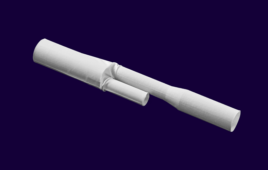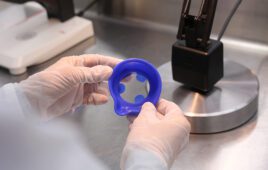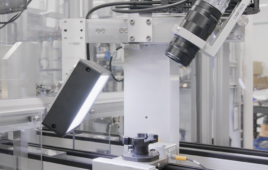 Lauren Roy graduated with a Bachelor of Science in Manufacturing Engineering from North Dakota State University in 2014. She began her career at Cretex Medical as a Quality Intern and her dedication and performance led to a full-time role after graduation. Over nine years, she progressed from Quality Engineer to Quality Engineer III, and eventually, a Senior Quality Engineer.
Lauren Roy graduated with a Bachelor of Science in Manufacturing Engineering from North Dakota State University in 2014. She began her career at Cretex Medical as a Quality Intern and her dedication and performance led to a full-time role after graduation. Over nine years, she progressed from Quality Engineer to Quality Engineer III, and eventually, a Senior Quality Engineer.
Lauren also held the role of Quality Engineering Supervisor, leading a team of inspectors, technicians, and programmers. Recently, she transitioned to an Engineering Supervisor in the Manufacturing Engineering department, showcasing her versatility and commitment to professional growth. Lauren is an emerging leader at Cretex Medical with a diverse skill set and a strong record of achievement in quality and manufacturing engineering.
What initially attracted you to the medtech industry? How has your perspective on the industry evolved over the course of your career?
I was drawn to the medtech industry because two of my cousins were diagnosed with Type II (Juvenile) diabetes as toddlers. Over the years, I watched how they went from injections after meals to their first insulin pumps and now to continuously monitored Bluetooth devices. Seeing how those devices changed their lives made me want to go into the industry and be part of impacting lives for the better.
At the beginning of my career I was aware of the well-known devices like pacemakers, surgical tools, and pumps and monitors for diabetes. It didn’t take long to realize that the medtech industry encompasses so much more than these innovations. I’ve learned even small advancements can make a significant difference in patients’ lives – improving their comfort, convenience, and overall well-being.
As a seasoned professional in the industry, how do you envision the future of medtech? What emerging technologies or trends do you believe will have the most significant impact?
I think the future of the medtech industry is moving towards a proactive stance on health, with emerging technologies playing a key role in improving healthcare outcomes and patient experiences. Many of the new projects we see are focused on preventative care and early diagnosis, to help patients avoid invasive procedures and intensive treatments for everything from cancer to cardiac rhythm management. The integration of Bluetooth technology into medical devices has been a pivotal development. It enables continuous data collection and transmission, allowing healthcare providers to access real-time patient information. This approach reduces the need for frequent in-person appointments, making healthcare more efficient and patient-centric.
From your experience, what are some of the key challenges that medtech engineers are likely to face in the coming years? How can professionals in the industry prepare for and navigate these challenges effectively?
One of the key challenges that medtech engineers are likely to face in the coming years is the pressure to bring products to market quickly while meeting stringent regulatory requirements. Currently, the validation and regulatory approval process can be quite time-consuming, and if risks are not properly managed, it can lead to further delays. Engineers need to be closely involved in the risk analysis and mitigation aspects of product development, as many regulatory submissions and validation efforts could face rejection due to inadequate risk identification and mitigation strategies.
To effectively prepare for and navigate these challenges, engineers need to prioritize learning and obtaining certifications in risk management and analysis. These certifications provide knowledge and the skills necessary to accurately identify potential risks associated with their products and develop effective strategies to mitigate them. By doing so, engineers can not only expedite the validation and regulatory approval process but also ensure the safety and efficacy of their medical devices, ultimately benefiting both patients and the company’s market share.
In your opinion, what areas or applications within medtech have the greatest potential for growth and innovation? Why do you consider them promising?
I believe the greatest potential for growth and innovation in the medtech industry is in pairing diagnostics and data analysis for use in preventative care. Technological advancements and the ways we can collect and analyze data have opened the possibilities for diagnosing medical conditions earlier and with more confidence. Combining this data with analytics software or AI, this can change how doctors diagnose and determine care procedures.
As technology continues to advance rapidly, how do you think medtech engineers can stay ahead of the curve and ensure they are equipped with the necessary knowledge and skills?
Stay ahead by learning as much as you can and continuing to invest in your personal growth. Education doesn’t stop after you finish school and earn your degree. For medtech engineers it is important to read industry magazines, medical journals, recent studies, and patient reviews to understand their experience and feedback. Gain perspective from medical teams across the world who are treating the same condition or learn how treatments for other conditions may parallel to your device or project. Engineers should also invest in classes and certifications to become subject matter experts and train outside of their expertise to gain a different perspective. Overall, it’s a dual process of continually learning and self-improvement that will allow engineers to advance in this quickly changing industry.
From a broader perspective, how do you see the role of medtech engineering in shaping the future of healthcare? What impact do you anticipate it will have on patient care and outcomes?
Everyone will encounter someone they care about who is facing health challenges and medtech engineers will shape the future of healthcare by addressing these needs. We possess the unique ability to identify problems and utilize our engineering skills to design solutions. Often, doctors recognize patient needs but lack the knowledge or resources to address them, especially when it involves a complex medical device. Engineers will draw from our personal experiences and drive innovations that positively impact the lives of others.
Considering the increasing importance of collaboration, how do you think medtech engineers can effectively collaborate with professionals from other fields, such as medicine and computer science, to drive innovation in the industry?
In my experience, effective collaboration across different fields requires leaving titles behind and treating everyone as equals. It’s important to actively listen and not make assumptions based on someone’s background. By setting aside preconceived notions, we can have more productive discussions and benefit from each other’s experiences. It’s crucial to create an environment where people feel comfortable openly collaborating and sharing ideas without feeling the need to prove themselves. In the medtech world we excel at bringing engineers and medical device manufacturers together, but we would benefit from more collaboration with doctors, surgeons and medical professionals. We need more opportunities for doctors and design engineers to engage with each other, share their expertise, and work together to develop innovative solutions.
How do you think diversity and inclusion can contribute to the advancement of medtech engineering? How do you foster a culture of innovation within your team or organization?
Inclusion and diversity are key to moving the medtech industry forward – without it the industry will become stagnant. Including diverse perspectives allows you to understand “both sides of the coin” and keeps you open to exploring new ideas. At the end of the day, you have to put everything aside and be inclusive to ensure everyone’s voice is being heard, because we all have an important voice.




